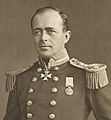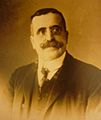1912 facts for kids
| Millennium: | 2nd millennium |
|---|---|
| Centuries: | 19th century – 20th century – 21st century |
| Decades: | 1880s 1890s 1900s – 1910s – 1920s 1930s 1940s |
| Years: | 1909 1910 1911 – 1912 – 1913 1914 1915 |
The year 1912 (also known as MCMXII) was a leap year starting on Monday in the Gregorian calendar. This means it had 366 days instead of the usual 365. Many important events happened around the world during this year, including new countries forming and amazing discoveries.
Contents
Key Events of 1912
New Countries and States
- January 1: The Republic of China was officially started.
- January 6: New Mexico became the 47th U.S. state.
- February 14: Arizona became the 48th U.S. state.
- February 12: The Republic of China began using the Gregorian calendar.
- March 30: France took control of Morocco as a protectorate.
Amazing Discoveries and Inventions
- February 14: The first diesel-powered submarine was launched in Groton, Connecticut. This was a big step for underwater travel.
- March 1: Albert Berry made history with the first parachute jump from a moving airplane.
- March 5: Italian forces were the first to use airships for military purposes. They used them to look for enemy positions near Tripoli.
- March 7: French pilot Henri Seimet completed the first non-stop flight from Paris to London. It took him three hours.
Important Expeditions
- January 17: British explorer Robert Falcon Scott and his team began their journey to reach the South Pole.
- March 7: Roald Amundsen announced that he had successfully reached the South Pole.
- March 16: On Scott's expedition, Lawrence Oates, who was very ill, left the tent. He famously said, "I am just going outside and may be some time."
Cultural and Social Milestones
- February 19: For the first time, prizes were put inside Cracker Jack candy boxes.
- March 12: The Girl Guides were founded. They later became known as the Girl Scouts.
- March 27: Mayor Yukio Ozaki of Tokyo gave 3,000 cherry blossom trees to Washington, D.C.. This gift showed the friendship between Japan and the United States.
The Sinking of the Titanic
- April 14–15: The famous ship, the R.M.S Titanic, hit an iceberg in the Atlantic Ocean and sank. Over 1,500 people lost their lives in this tragic event.
Nobel Prize Winner
- Alexis Carrel, a French surgeon, won the 1912 Nobel Prize in Physiology or Medicine. He was recognized for his work on blood vessel surgery and organ transplants.
People Born in 1912
Many famous people were born in 1912, who would later become important figures in art, science, and politics.
- January 28 – Jackson Pollock, a famous American painter.
- March 12 – Pat Nixon, who became the 39th First Lady of the United States.
- June 23 – Alan Turing, a brilliant British mathematician and computer scientist.
- September 5 – John Cage, an influential American composer.
- October 17 – Pope John Paul I, who became the leader of the Catholic Church.
- December 22 – Lady Bird Johnson, who became the 38th First Lady of the United States.
Notable People Who Died in 1912
The year 1912 also saw the passing of several important individuals.
- February 12 – Gerhard Armauer Hansen, a Norwegian doctor and scientist.
- May 30 – Wilbur Wright, one of the American brothers who invented the airplane.
- April 15 – Over 1,500 people died when the R.M.S Titanic sank.
- December 11 – James Otis, an American children's writer.
Arts and Entertainment in 1912
Images for kids
-
March 7: Amundsen and the South Pole
-
March 27: Cherry trees for Washington, D.C.
-
April 15: The RMS Titanic sinks
-
Saint Nikolai of Japan
-
King Frederick VIII
See also
 In Spanish: 1912 para niños
In Spanish: 1912 para niños
Black History Month on Kiddle
African-American Labor Activists
 | Bayard Rustin |
 | Jeannette Carter |
 | Jeremiah A. Brown |

All content from Kiddle encyclopedia articles (including the article images and facts) can be freely used under Attribution-ShareAlike license, unless stated otherwise. Cite this article:
1912 Facts for Kids. Kiddle Encyclopedia.








































